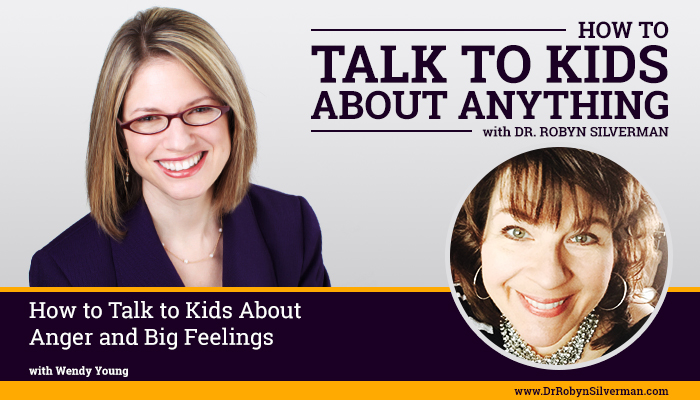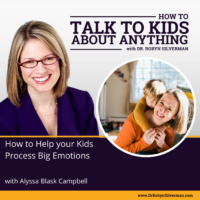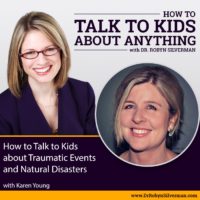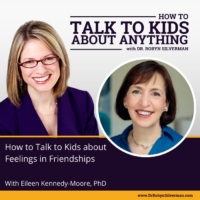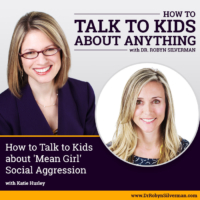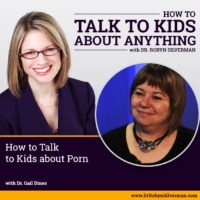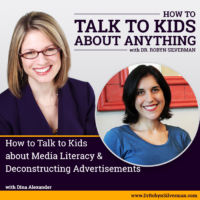Podcast: Play in new window | Download
Subscribe: Apple Podcasts | RSS | More
How to Talk to Kids About Anger & Big Feelings
Many people are currently sheltering in place or socially distancing due to COVID-19– and that means a great deal of time with family in one space. Being quarantined during the coronavirus outbreak with kids can be tough as limited time alone and lots of family togetherness can breed some big feelings like anger and frustration. How can we help our children? How can we help ourselves? This podcast will focus on how to help children cope with intense feelings such as anger or frustration. Wendy Young provides specific hands-on strategies, scripts and scientific background to help parents and educators know exactly what to do when feelings get big and behavior is challenged. How do you recognize anger cues? How do you calm down angry feelings? How do you devise an anger plan to help kids for the next time? Dr. Robyn Silverman’s expert guest, Wendy Young, provides what you need to talk to kids about anger and big intense feelings, right here.
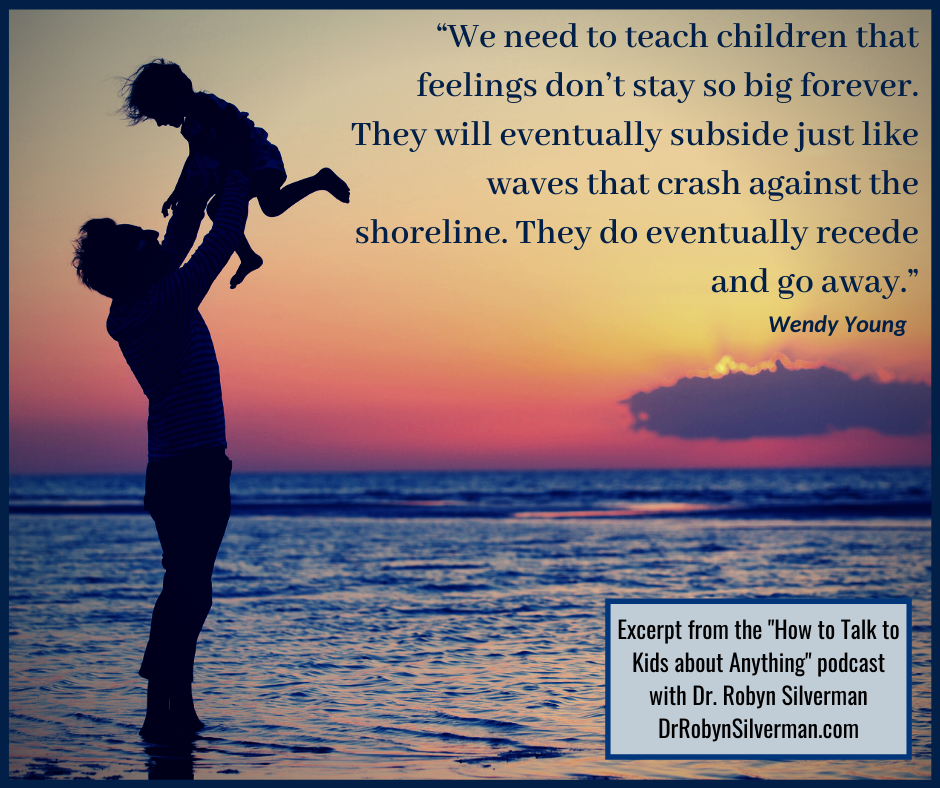 Special Guest: Wendy Young
Special Guest: Wendy Young
Wendy Young is the mom of three, an award-winning child & adolescent therapist, early childhood and infant mental health consultant and the co-author of BLOOM: 50 things to Say, Think and Do with Anxious, Angry and Over-the-Top Kids. Her expertise includes: anger management, grief and loss, trauma and behavioral disorders of childhood. Her life’s work has benefited millions worldwide. She is a sought after trainer, known for her creative interventions that produce real and lasting change. She graduated Summa Cum Laude from Michigan State University’s School of Clinical Social Work and resides with her family in Michigan’s Upper Peninsula. You can find out more about Wendy and all she does on her website Kidlutions.blogspot.com
This podcast provides:
- Tips:
- How to co-regulate
- How to get off the anger merry-go-round.
- How to use “a bug and a wish.”
- How to help kids realize the anger cues
- How to construct a mad box and why
- How to process the feelings and interactions after the incident is over.
- Speaking out loud about our own anger and how we process it
- N.O.W. Learn how to Normalize, Offer opportunities/strategies, Work with children on managing big feelings
- Scripts:
- What to say when your children have big feelings and are showing intensity.

- How to help children describe how big their feelings are at that moment.
- Helping kids know what to do when they want to engage in negative behaviors- what can we do instead?
- How to give hope when helping kids managing big, intense feelings
- How to process the feelings after the incident is over
- Walking through the steps of calming down our anger out loud.
- Exactly what to say when children are in the throws of messy feelings.
- What to say when your children have big feelings and are showing intensity.
Important Messages:
- Kids are born with different temperaments- we can support our children no matter whether they are easy going or intense.
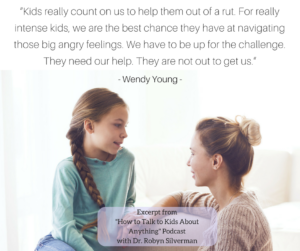
- The emotional part of the brain is much bigger than the cognitive!
- We have to co-regulate so that our brains and emotions can help regulate our children’s brains.
- Children get on the anger merry-go-round.
- Feelings don’t stay this big. We need to give kids hope and help.
- Sensory skills soothe the limbic system- like deep breaths and other physical techniques.
- Be intentional about sharing the scripts that help YOU calm down when you are angry and allow your children to hear your positive self talk in action.
- Stay emotionally available by staying calm yourself.
- We give our children a template of how to act and handle big feelings.
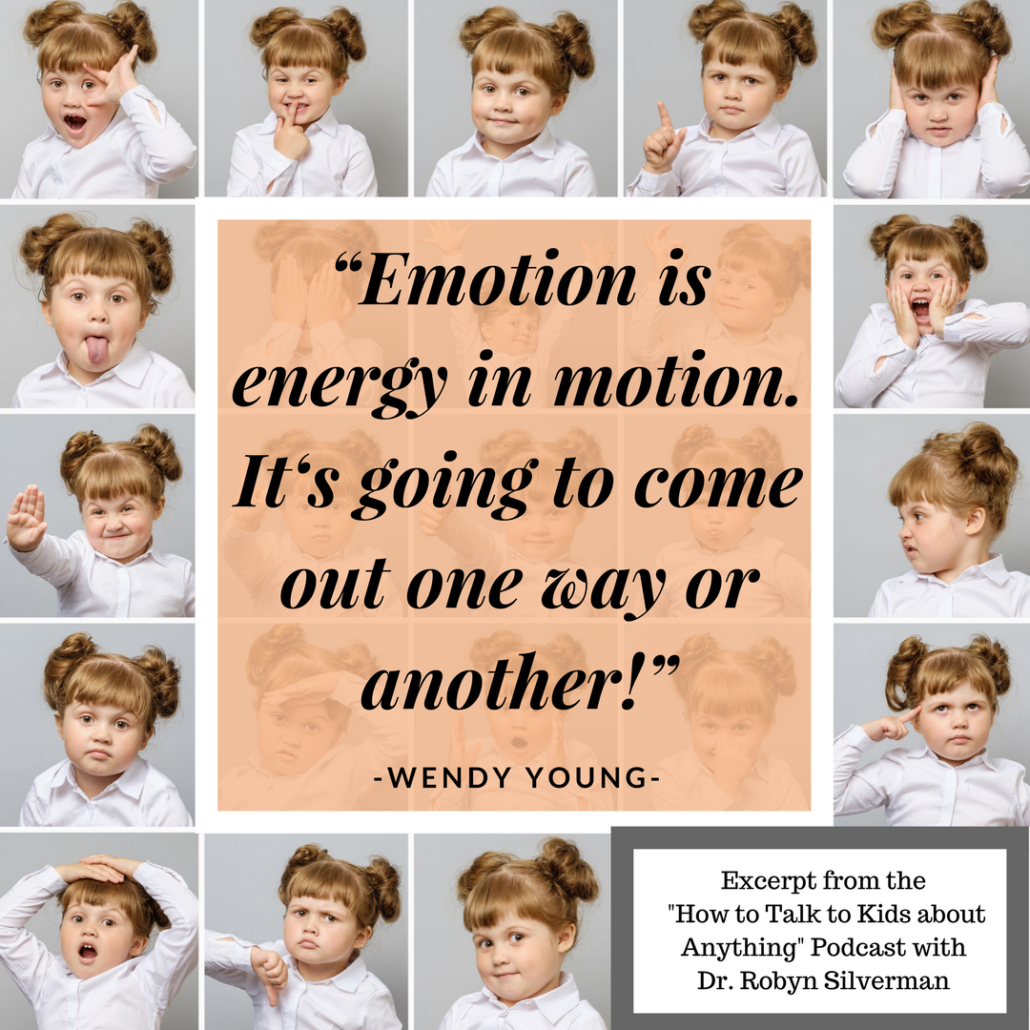
Notable Quotables:
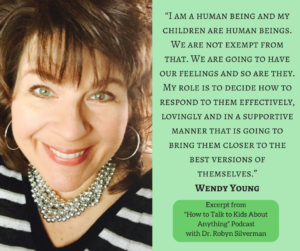 “Kids really count on us to help them out of a rut. For really intense kids, we are the best chance they have at navigating those big angry feelings. We have to be up for the challenge. They need our help. They are not out to get us.”
“Kids really count on us to help them out of a rut. For really intense kids, we are the best chance they have at navigating those big angry feelings. We have to be up for the challenge. They need our help. They are not out to get us.”
“Emotion is energy in motion. It‘s going to come out one way or another.”
“We need to teach children that feelings don’t stay so big forever. They will eventually subside just like waves that crash against the shoreline. They do eventually recede and go away.”
“If we happen to raise our voice, because we are human beings ourselves, I can say, I’m 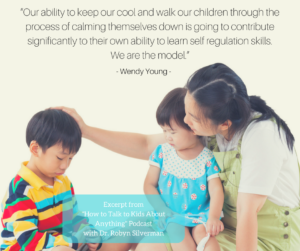 sorry, I didn’t mean to yell, I wish I had calmed myself down more first. What can we do better next time? Not one of us is perfect. But I always say this; Who better to raise a human child than a fellow human being?”
sorry, I didn’t mean to yell, I wish I had calmed myself down more first. What can we do better next time? Not one of us is perfect. But I always say this; Who better to raise a human child than a fellow human being?”
“Our ability to keep our cool and walk our children through the process of calming themselves down is going to contribute significantly to their own ability to learn self regulation skills. We are the model.”
“I am a human being and my children are human beings. We are not exempt from that. We are going to have our feelings and so are they. My role is to decide how to respond to them effectively, lovingly and in a supportive manner that is going to bring them closer to the best versions of themselves.”
Resources:
- www.Kidlutions.com
- The Anger Toolbox Teleseminar
- Bloom: 50 Things to Say, Think & Do with Anxious, Angry or Over-the-Top Kids
- Cool down strategies for kids
- @Kidlutions on Twitter, Kidlutions on Facebook

